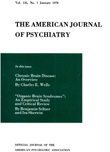RESULTS OF PSYCHIATRIC TREATMENTS WITH A CONTROL SERIES
Abstract
1. This report on schizophrenia is a first step in building up a control group of the results of hospital psychiatric treatment. First shown are 393 consecutive schizophrenia patients admitted in 1925-34 before the coming of any shock treatments.
2. A comparison is made with 440 consecutive schizophrenic patients admitted in 1940-46 to the same hospital conditions but with insulin and electric shock series available and frequently used.
3. The shock treatments seem to be a push in the upward direction in schizophrenia: there are more recoveries sustained to the 5th year, more slightly improved, fewer unimproved, many more recovered and relapsed in the 5 years, and more recovered in the group that could not be followed.
4. Relapsed cases, both in and later than the 5th year period, raise the question as to whether shock treatments are enough. The fact must be taken into account that the 1940-46 patients had all the adjuvant hospital treatment that was given to the earlier control [see table 3 in source PDF] patients. Also the later patients had heard of and often seen the striking changes following shock treatments. One of the patients had been for 10 years in the hospital, the most obvious, regressed, typical schizophrenic: after a course of insulin he became a normal appearing, pleasantly talkative individual for a week and then he again regressed. The impact of the week's change on patients and nurses was powerful.
5. In the first table of results are included cases whose long duration before this hospitalization or treatment put a tremendous burden on therapy. In the control group 11 cases had run 6 to 7 years, 15 cases had run 8 to 10 years, 12 cases had run 11 to 15 years, and 10 cases had run 16 to 29 years. In the 1940-46 group 3 cases had run 6 or 7 years, 10 cases had run 11 to 15 years, and 7 cases had run 16 to 38 years.
6. The shorter the duration before therapy the better the results—with this truism goes the disturbing thought that the shorter the duration the more uncertain the diagnosis.
7. More patients recover and stay well under shock therapies but also more recover and relapse.
Access content
To read the fulltext, please use one of the options below to sign in or purchase access.- Personal login
- Institutional Login
- Sign in via OpenAthens
- Register for access
-
Please login/register if you wish to pair your device and check access availability.
Not a subscriber?
PsychiatryOnline subscription options offer access to the DSM-5 library, books, journals, CME, and patient resources. This all-in-one virtual library provides psychiatrists and mental health professionals with key resources for diagnosis, treatment, research, and professional development.
Need more help? PsychiatryOnline Customer Service may be reached by emailing [email protected] or by calling 800-368-5777 (in the U.S.) or 703-907-7322 (outside the U.S.).



